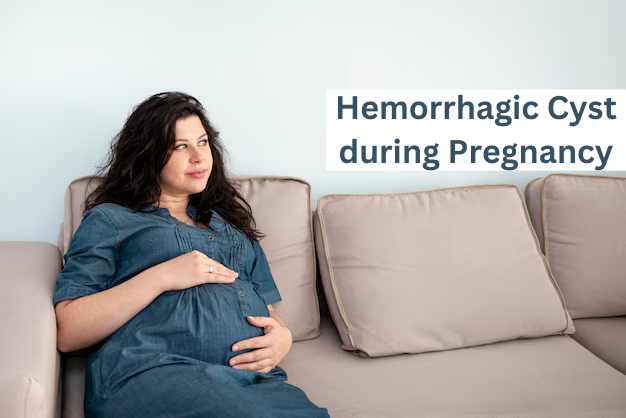Hemorrhagic Cyst during Pregnancy
A hemorrhagic cyst is a fluid-filled sac in the ovary that has bled. While they can be alarming, hemorrhagic cysts during pregnancy are usually not serious. In most cases, they cause no symptoms and do not harm the baby.
What are the causes of hemorrhagic cysts?
The exact cause of hemorrhagic cysts is unknown, but there are several possible factors, including:
Hormonal changes: The hormonal changes that occur during pregnancy can cause cysts to form.
Blood vessel rupture: A blood vessel within the cyst can rupture, causing it to bleed.
Trauma: Trauma to the abdomen can cause a cyst to bleed.
What are the symptoms of hemorrhagic cysts?
Most hemorrhagic cysts do not cause any symptoms. However, some women may experience:
Pelvic pain: This pain may be sharp or dull, and it may come and go.
Vaginal bleeding: This bleeding may be light or heavy, and it may be accompanied by clots.
Nausea and vomiting: These symptoms are more common if the cyst is large or if it is causing irritation.
How are hemorrhagic cysts diagnosed?
Hemorrhagic cysts are usually diagnosed with an ultrasound. This test can help to determine the size and location of the cyst, as well as whether it is bleeding.
What is the treatment for hemorrhagic cysts?
Most hemorrhagic cysts do not require treatment. If the cyst is causing symptoms, your doctor may recommend:
Pain medication: Over-the-counter or prescription pain medication can help to relieve pelvic pain.
Bed rest: Resting can help to reduce bleeding and swelling.
Heat therapy: Applying heat to the abdomen can help to relieve pain and promote healing.
Surgery: In rare cases, surgery may be necessary to remove a large or complex cyst.
What are the risks of hemorrhagic cysts?
Hemorrhagic cysts are usually not serious, but there are a few potential risks, including:
Infection: If the cyst ruptures, it can increase the risk of infection.
Ectopic pregnancy: In rare cases, a hemorrhagic cyst can interfere with pregnancy.
Premature birth: If the cyst is large or if it is causing irritation, it can increase the risk of premature birth.
How can I prevent hemorrhagic cysts?
There is no sure way to prevent hemorrhagic cysts, but there are a few things you can do to reduce your risk, including:
Maintaining a healthy weight: Being overweight or obese can increase your risk of developing cysts.
Eating a healthy diet: Eating a diet that is rich in fruits, vegetables, and whole grains can help to reduce your risk of cysts.
Exercising regularly: Exercise can help to maintain a healthy weight and reduce your risk of cysts.
Taking birth control pills: Birth control pills can help to regulate your hormones and reduce your risk of cysts.
When should I see a doctor?
You should see a doctor if you experience any of the following symptoms:
- Pelvic pain
- Vaginal bleeding
- Nausea and vomiting
- Fever
Conclusion
Hemorrhagic cysts are common during pregnancy, but they are usually not serious. If you are diagnosed with a hemorrhagic cyst, it is important to see a doctor to monitor your condition and to receive appropriate treatment.
Frequently Asked Questions (FAQs)
1. What is a hemorrhagic cyst?
A hemorrhagic cyst is a fluid-filled sac on the ovary that contains blood. It typically forms when a follicle (the sac that contains an egg) ruptures and bleeds. While most hemorrhagic cysts are benign, they can cause discomfort and may require monitoring during pregnancy.
2. Are hemorrhagic cysts common during pregnancy?
Yes, hemorrhagic cysts are relatively common and can occur during pregnancy, especially in the early stages. Many women may have them without even knowing, as they often do not cause symptoms.
3. What symptoms should I watch for with a hemorrhagic cyst?
Common symptoms include:
- Pelvic or abdominal pain
- Discomfort during sexual intercourse
- Nausea or vomiting
However, many women do not experience any symptoms.
4. How are hemorrhagic cysts diagnosed?
Hemorrhagic cysts are typically diagnosed through a pelvic ultrasound, which helps visualize the cyst. Your healthcare provider may also order blood tests to check hormone levels and rule out other conditions.
5. Will a hemorrhagic cyst affect my pregnancy?
In most cases, hemorrhagic cysts do not impact the developing fetus or the overall pregnancy. Regular monitoring by your healthcare provider ensures that both you and your baby remain healthy.

 Oct-24-2024
Oct-24-2024